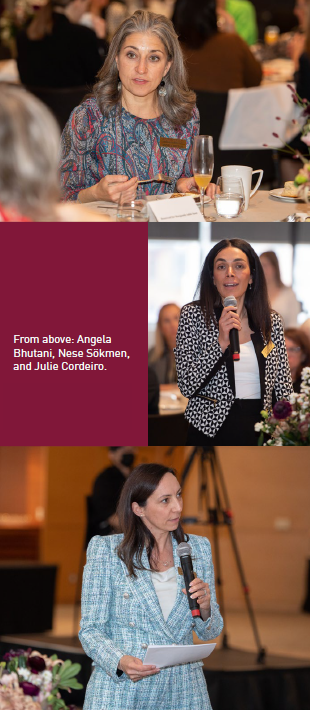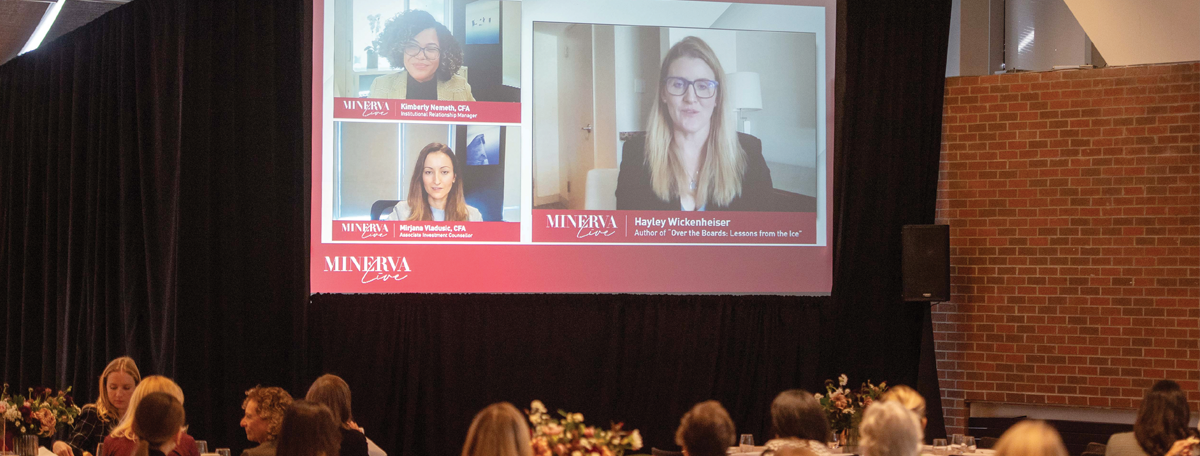Hayley Wickenheiser is known as one of the greatest Canadian hockey players to ever set foot on the ice. She was a member of Canada’s women’s national team for over two decades, scoring 168 goals, competing in five Winter Olympics, and earning four gold medals. Since her retirement from playing in 2017, Wickenheiser has risen to be the Toronto Maple Leafs assistant general manager and is a resident physician, having graduated from medical school in 2021. Her story is one of resiliency, integrity, passion, and what it means to never give up. The takeaways from her book, Over the Boards, are relatable to principles of long-term investing, especially when it comes to navigating volatile markets, the likes of which we’ve seen over the last few years and will undoubtedly experience many times over in our lives. In November 2022, Wickenheiser joined Burgundy associate investment counsellor Mirjana Vladusic and institutional relationship manager Kimberly Nemeth to discuss the bestselling memoir.
Mirjana Vladusic (MV): Many of the lessons in your book are relatable to us as investors. You talk about experiencing failure as a component of building a foundation for long-term success. Can you elaborate?
Hayley Wickenheiser (HW): When I was 19, I played in my first Olympics in Nagano, [Japan]. I thought we were going to go there and win. I didn’t think too much about losing. I thought: We’re from Canada. We win all the time. I didn’t contemplate how I would react or what would happen if things went poorly. It was the first time that women’s hockey was ever in the Olympics, resulting in a lot of hype. At the end of the gold-medal game, I was standing on the blue line with the silver medal around my neck and I remember thinking two things. The first was: I don’t want anyone to see me cry. And the second was: I never want to feel this way again.
I went home and sank into a depression. It happens to a lot of athletes after the Olympics because there is a big high leading up to the Games, then there is a big crash when they are over. For two weeks every four years, the world is watching—then you go home and nobody watches anymore.
I was really wrapped up in what I did. If I was playing well, if I was scoring goals, if we were having success, then I was worthy. If we weren’t, or we failed, my self-esteem plummeted. I didn’t have the ability to separate from this. At that time, I wore only one hat, which was that of a hockey player.
It was about six months after I was home from the Nagano Olympics that my coach, an amazing guy named Wally Kozak, gave me a piece of paper with a quote that said, “A gold medal is a wonderful thing, but if you’re not enough without it, you’ll never be enough with it.” I still have that quote folded up in my wallet. I took it to every major world championship and Olympic Games. I’d tape it up in my stall as a reminder to have perspective. Losing for me at a young age taught me that sometimes you have to lose to know how to win. In the preparation for things in life, it is important to think about how you’ll react if things go well, but you also need to prepare for the possibility of failure.
“In the preparation for things in life, it is important to think about how you’ll react if things go well, but you also need to prepare for the possibility of failure.”
Kimberly Nemeth (KN): As a young girl, you faced criticism for playing a “boy’s game,” and in the midst of the pandemic you spoke up against the IOC [International Olympic Committee] urging them to defer the 2020 Tokyo Games. Going against the grain, against the status quo, so to speak, is commonly required for success in investing. How did you cultivate this contrarian mindset? How can someone overcome the pressure to conform?
HW: I grew up in a small town in southern Saskatchewan. My mom and dad were schoolteachers and they normalized being different. When I wanted to play hockey, I was the only one in my town wanting to do so at the time. Instead of seeing this as a barrier, my parents said, “Sure, we’ll build a rink in the backyard. No big deal.” Also, my parents cared for people with [mental and physical disabilities] in our home while I was growing up. This showed me that all people are unique. My parents taught me that you should always do what’s right and never be afraid to be different.
It wasn’t difficult for me to advocate for athletes and confront the IOC. The reality in the early days of the pandemic was that I was living and working in a hospital where I was watching otherwise healthy people die of COVID-19. So I thought to myself: If I don’t speak up, who will? Who’s more qualified within the athlete group to do so? I consulted a number of people and I thought a lot about the downside. When you are going against the grain, it’s important to weigh the pros and cons. Common sense prevailed in the end, and the IOC made the decision to move the Olympics to the following year. They were probably going to do that whether I spoke up or not, but I decided it was best to speak up early to force their hand.
MV: In your last chapter, you talk about the Sochi Olympic Games and the pressure you felt to bring home the gold. With that kind of pressure, it becomes very difficult to manage emotions, yet mastering this skill is important for people as individuals and as investors. What have you learned about how we can better manage our innate physiological and emotional responses?
HW: A lot of hockey is about managing your emotions. You have 10 people in a small space. They’re constantly crashing into each other. Your heart rate is through the roof. You become fatigued. And you’re trying to cognitively find a way to put this black biscuit into the back of a net. It’s high stress, and you always see what people are made of when they are under this level of stress.
Now that I’m in medicine, I find that my hockey training helps me in high-pressure moments. At the start of my first ICU rotation, I was nervous. If there were code blues, would I keep it together? We did experience a code blue inside a CT scanner, and I was one of the few people on the scene, so I had to start running the situation. People were panicking because we were not in the setting where monitors are readily available. But what I find happens to me is that under more pressure, I become calmer, and that’s probably because of how I trained. I don’t think this is something that you are or aren’t. I really think that emotional control can be trained.
Early in my hockey career, I was kind of a hothead. Through the years, I had some great coaches who taught me that I would be a more effective player if I could stay out of the penalty box and [instead] put points on the scoreboard. I worked on changing the narrative.
In [high-stress situations], I try to think about being at 30,000 feet in an airplane looking down on and assessing the situation versus being a deer in the headlights. I also use visualization. Athletes do this all the time. I get the puck; I’m under pressure; I want to score on a breakaway. What am I going to do to accomplish this? It helps to visualize the process in advance.
The last thing I would say is that sometimes you just have to fake it to make it. As an athlete, when I was miserable, tired, and cranky, I would force myself to smile, pull my shoulders back, and walk into the rink like it was the first time. When you do that, physiologically, you can’t help but be in a better mood.
KN: Can you talk about how you took control of managing your own finances and the value of having a long-term plan?
HW: When I was 15, I became a carded athlete in Canada, which means you are considered to have the potential to win a medal or be part of a successful organization. You receive money to live and train on. I was receiving about $800 a month. I believe that, today, Canadian carded athletes earn around $1,500 a month, so it is difficult to make ends meet. [Editor’s note: As of 2022, carded athletes earn “an allowance” of a maximum of $1,765.]
At a young age, I happened to meet Steve Shannon, a financial planner from Calgary I still work with today. He taught me about saving, investing for the long term, and having a long-term plan. I started to put away about a quarter of my $800 salary every month, which added up over time. Everyone needs to be educated at a young age about what their money can do over time and how to take care of it. I was lucky. I had good people, and that set me up well.
MV: It’s great to hear that you’ve been involved in investing from such a young age. It’s an important lesson. I now want to switch topics and ask you about Hockey Canada. After a controversial year, what changes are needed for Hockey Canada to be a success in the future?
HW: First, let me say that what’s gone on is totally wrong, disgraceful, and embarrassing. I struggle with being so proud to have played within Hockey Canada to represent Canadians, but I separate representing Canada from the bad behaviour that has taken place inside the organization. The women’s side of the game is in pretty good shape. But on the men’s side, I think we need to reform the culture. A couple of things that would help moving forward are a total forensic financial audit going back to the late 1990s and a national inquiry. The change in leadership has started. There’s more that needs to come.
We need to continue to educate people and place importance on the grassroots of hockey. Hockey Canada is both top-down and bottom-up. Of course, we need the Olympics and the world championships to be successful because that’s what inspires and drives the game. But we also need to be aware of what’s happening with the grassroots. We need to make the game cheaper to play. We have many new Canadians from other parts of the world where hockey is not part of their culture. How do we get people to care and be interested in hockey and make it more accessible?
And then there’s safe sport. At times throughout my career, I’ve thought that people believe that you’re weak if you’re kind and respectful and if you emphasize safety in locker rooms, on teams, and in workplaces. It couldn’t be more opposite. We have to have an approach that will make everyone feel they can be themselves and create a game that people are going to want to play for a long time. Because right now, kids, especially boys, are dropping out in droves.
KN: Hayley, what does leadership mean to you and what legacy do you want to leave for the next generation of women?
HW: As a leader, I believe you cannot ask someone to do something that you are not willing to do yourself. When I played, I wanted to follow people who were willing to get in the trenches. If they wanted you to perform at a certain level, they demonstrated it. Action is extremely important.
People want to know you care about them before they will care about what you have to say. Take an interest in the people that you work with—who are they away from the office? What’s their life like? Often, when people have difficulty, it is due to something happening in their personal life, or an inability to cope. If you know someone well, you can have a meaningful conversation with them.
Good leaders have to not be afraid of being unpopular. You have to be prepared for conflict and you need to be totally honest and authentic. Being candid about a person’s performance, whether good, bad, or otherwise, is a way to help that person move forward.
It’s important to come from a place of authenticity and compassion, especially now, coming out of the pandemic. People’s fuses are short, they are stressed. I really see it in medicine. And just applying a little empathy at the right time can diffuse tough situations and elevate people to perform better.
We often try to control every little thing in our lives, but there is so much that happens that you just can’t control. Accept this. Work to live and find ways to experience joy every day.
This post is presented for illustrative and discussion purposes only. It is not intended to provide investment advice and does not consider unique objectives, constraints or financial needs. Under no circumstances does this post suggest that you should time the market in any way or make investment decisions based on the content. Select securities may be used as examples to illustrate Burgundy’s investment philosophy. Burgundy funds or portfolios may or may not hold such securities for the whole demonstrated period. Investors are advised that their investments are not guaranteed, their values change frequently and past performance may not be repeated. This post is not intended as an offer to invest in any investment strategy presented by Burgundy. The information contained in this post is the opinion of Burgundy Asset Management and/or its employees as of the date of the post and is subject to change without notice. Please refer to the Legal section of this website for additional information.

